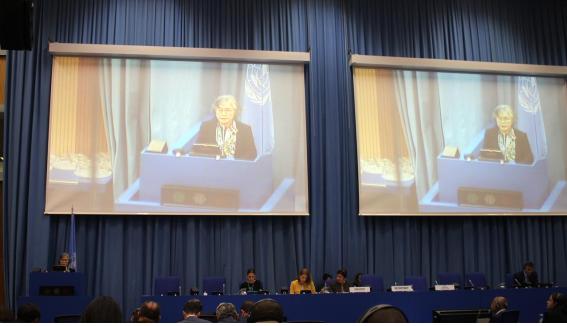News & Publications
Press Release
Government’s strong will and policies to eradicate corruption introduced at the UN
- Date2017-11-24
- Hit1,525
ACRC chairperson Pak presented the new administration’s anti-corruption policy direction at the Conference of State Parties to the UNCAC on 6th November

The new administration’s anti-corruption policies was introduced to the international community, which includes the operation of president-presided anti-corruption policy consultation council, severe punishment of the five major corruption offences such as bribery and embezzlement, etc., eradication of arms procurement irregularities, establishment of the anti-corruption consultation body based on the public-private partnership.
The Anti-Corruption and Civil Rights Commission (ACRC, chairperson Pak Un Jong) took part in the seventh session of the Conference of State Parties to the UN Convention against Corruption held on 6th Nov. (in local time) in Vienna, Austria to introduce the new administration’s anti-corruption efforts and its strong will to fight corruption.
The UN Convention against Corruption (the “UNCAC”) is the first ever international legally binding anti-corruption convention that addresses corruption issues in both the public and private sector, which entered into force in 2008 in Korea. As of now, 183 countries have committed to the UNCAC.
Approximately 1,500 government representatives and those active in the anti-corruption efforts in international organizations and civil society groups participated in the CoSP to the UNCAC held from 6th to 10th Nov. to share their progress and setbacks in the implementation of the UNCAC and discuss issues such as prevention of corruption, recovery of assets acquired through corruption, international collaboration on law enforcement, etc.
Chairperson Pak said in her keynote speech on 6th Nov. (in local time) with regard to the political scandal involving the former president’s longtime confidante Choi Soon-sil indicted of meddling in government affairs behind the scenes that “Korea could ride out the ordeal caused by the political scandal in a peaceful and democratic manner on the strength of its anti-corruption capabilities that have indwelled in the legislative, executive and judicial branches of the government and in the civil society,” and also added that “this rather proves that the rule of law is well established in Korean society and that Korea has strong resilience to corruption to move forward towards transparent and fair society.”
Chairperson Pak also explained at the Conference that the ACRC, Korea’s anti-corruption control tower, will push ahead with powerful anti-corruption drive, including through the operation of president-presided ‘anti-corruption policy consultation council’, severe punishment of the five major crimes such as bribery and influence peddling, etc., prevention and severe punishment of arms procurement corruption, eradication of unfair practices in the private sector.
In addition, chairperson Pak met representatives of international organizations including the Transparency International to explain anti-corruption efforts made by the Korean government to increase Korea’s CPI and introduce its anti-corruption policy direction. She also met the head of the Iraqi Commission of Integrity and the chairperson of the Administrative Control and Transparency Authority of Qatar to discuss ways to cooperate in anti-corruption efforts with the Arab countries.
* Corruption Perceptions Index: an index published annually by Transparency International to show perceived levels of public sector corruption of countries/territories around the globe
The ACRC has introduced Korean government’s strong will to combat corruption and high level of civic awareness of Koreans to the international community during its participation in the CoSP to the UNCAC, thereby contributing to improvement in foreign perspectives on Korea’s anti-corruption and integrity efforts.









